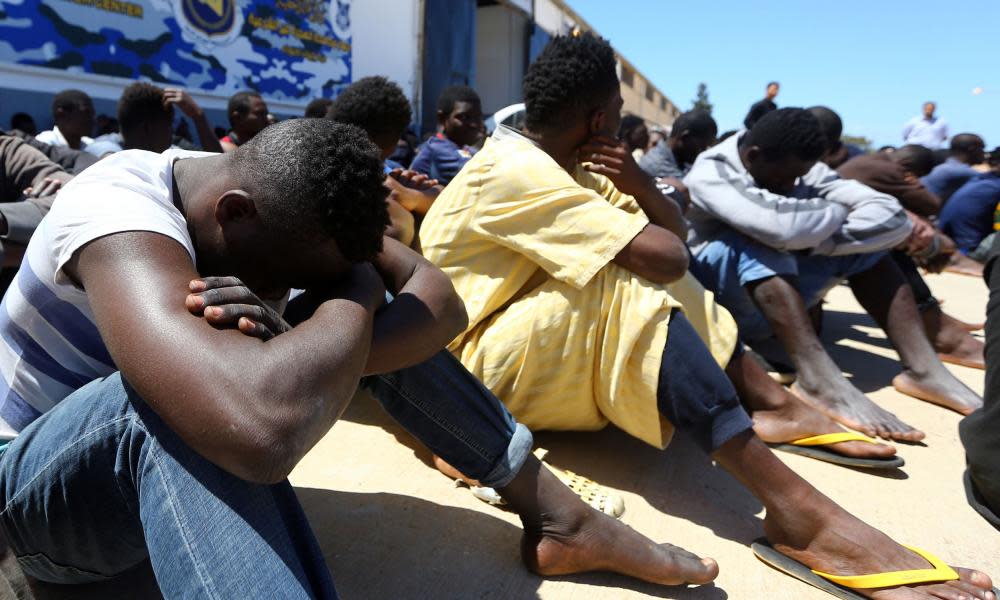Italy police arrest three over rape and torture of migrants in Libya

Detectives in Sicily have arrested three men who allegedly raped and tortured dozens of migrants in a detention centre in the north-west of Libya.
Prosecutors in Agrigento have collected testimonies from numerous asylum seekers from north Africa who allegedly recognised their former captors at a migrant registration centre in Messina, Sicily.
The three alleged captors, a 27-year-old Guinean man and two Egyptians aged 24 and 26, are accused of torture, kidnapping and human trafficking.
“All the women who were with us, once housed inside the shed, were systematically and repeatedly raped,” reads the testimony of a migrant contained in the investigation documents seen by the Guardian. “We were locked up and they gave us hard bread and seawater to drink.”
Related: ‘Life-saving’: hundreds of refugees to be evacuated from Libya to Rwanda
The victims, held in Libya from July 2018, also reported that the torturers kept them in the detention centre until their relatives paid for their release. If they had no money, they were sold as slaves or killed.
“They gave us a phone to contact our relatives so we could instruct them how to pay for our release,” another migrant told magistrates. “During my imprisonment I saw two migrants shot dead because they tried to escape.”
According to the testimonies, the three men operated in the notorious Zawiya detention centre, a former military base in north-west Libya, about 28 miles (45km) west of Tripoli. According to witnesses, the detention centre included an abandoned UN container where migrants were kept prisoners.
The head of the detention centre was a powerful Libyan man named Ossama, according to the victims. Short, balding with grey hair, Ossama, described as a migrant-smuggling kingpin, has allegedly been seen whipping migrants using electric cables.
“He always carries two guns with him and, together with his affiliates, gang-raped numerous women,” said the migrants.
According to prosecutors, the investigation shines a light on the conditions endured by migrants currently held in Libya or being deported back by the Libyan coastguard.
“This investigation confirms the inhumane living conditions within the so-called Libyan detention centres, and the need to act at international level for the protection of human rights and for the repression of these crimes against humanity,” the chief prosecutor of Agrigento, Luigi Patronaggio, wrote in a press release.
For more than two years, the Libyan coastguard, supported by Italy, has been patrolling the waters and stopping boats from leaving Libyan shores for Europe. Under the terms of the deal Italy agreed to train, equip and finance the coastguard.
The migrants intercepted by the Libyan coastguard are returned to so-called detention centres where, according to aid groups and the testimonies of asylum seekers, they suffer unspeakable violence, rape and torture.
Last week, the UN support mission in Libya released a report suggesting that rescued migrants deported back to Libya were later sold to smugglers by the Libyan police.
“Serious concerns continue with regard to the transfer of migrants rescued or intercepted at sea by the Libyan coastguard to unofficial detention centres in Khums,” reads the report, seen by the Guardian.
“Hundreds of rescued migrants who were reported to have been sent to detention centres were later listed as missing, and it is believed they may have been trafficked or sold to smugglers, while others have disappeared.”
Meanwhile, two high-ranking officials of the Italian Navy and Coast Guard will be tried on charges of manslaughter and negligence for a shipwreck occurred on 12 October 2013 in which 268 people died, including 60 children, mostly from Syria.
The two officials have been prosecuted this year for the delays in the rescue operations. According to prosecutors, they refused to send a Navy vessel because they were waiting for the Libyan authorities to intervene. But it was too late and the boat capsized.
They deny the claims. The trial is set to start next December.

 Yahoo News
Yahoo News 
